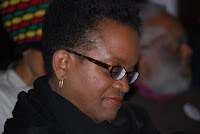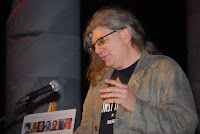
On the final afternoon of the Georgetown/Lannan conference I was sitting in my usual place in the front row listening to the artists’ panel when Rod Smith came to my side holding his cell phone out to me with something on the screen. Digging in my pockets I found my reading glasses and saw that what he was showing me was a web site carrying the news that the great Aimé Césaire had died the night before. Rod and I quietly beckoned to poet Eugene Redmond, who was sitting at the near end of the panel table, and shared the news with him. Eugene waited for the current speaker to conclude, then announced the sad news to the audience. A hush gathered in the crowd as the understanding set in; this man whose work had influenced nearly a century of thinking and writing all around the globe was gone from us.
That night, Jayne Cortez began her reading with what has always been for me a central poem in her body of work, "At A Certain Moment In History," which speaks of Césaire and how at "that moment of no compromise / his poetry became poetry unique to poetry" – You can hear that reading by clicking in the title area of this post –
The photograph of Jayne Cortez is one that I took while she was speaking on that panel which was interrupted by the news.
The photograph of Césaire is probably the most recent one you will see. It was taken by Phyllisa Smith, a PhD student at Penn State, when she was able to visit with the poet and philosopher on a trip to Martinique just this past January. I am grateful that she is willing to share this photograph with the rest of us.











































































